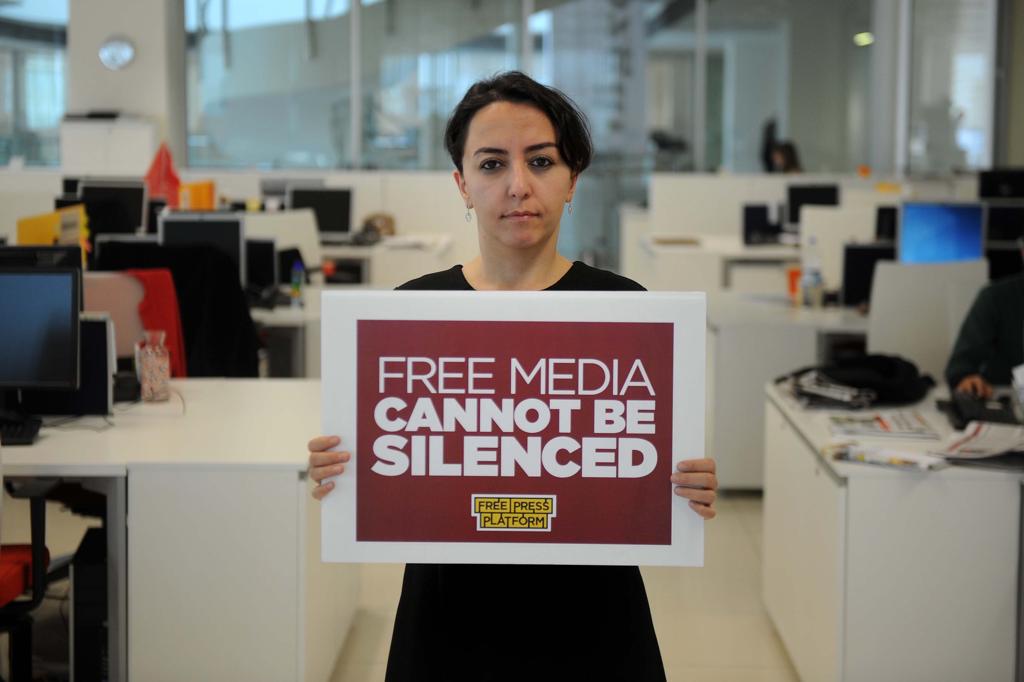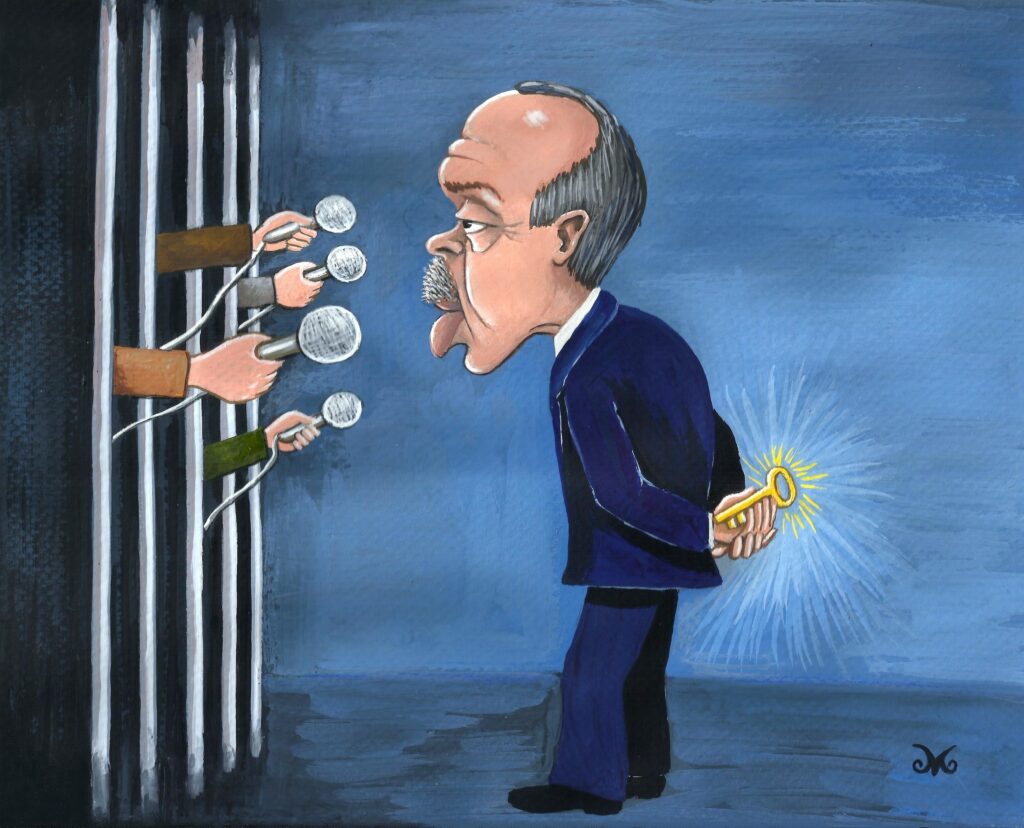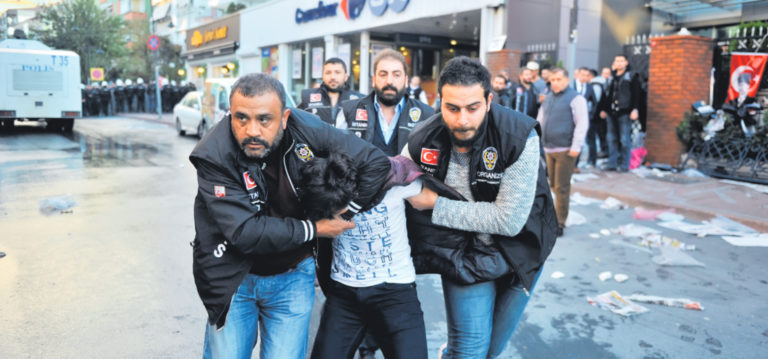
By Nur Dogan
In the last days when journalists could report news freely, we did not know we might be silenced soon. We would not only be silenced but would also lose our freedom. While some would be detained, others were forcibly exiled. So, what happened to journalists in Turkey during the Justice and Development Party (AKP)’s rule?
On Dec. 17, 2013, the televisions were turned on to watch the latest news in the morning. All TV channels presented the same issue, “an enormous corruption operation by the sons of four ministers and some businessmen in the government’s circle, they have been detained!” The accusations were serious – money laundering, bribery and corruption. Eight days later, on Christmas Day 2013 Prime Minister Erdogan’s son, Bilal Erdogan, was also called to testify as a suspect, but he ignored the call.
It was a landmark for Turkish media. In the aftermath of the operation, Erdogan commenced threatening media companies in his live broadcast speeches. Any reporter who courageously asked about the corruption in the Prime Minister’s press conferences immediately got fired by direct pressure from the PM’s office.
As a result of all this continuous pressure, I can confidently say that Turkey has been the largest prison for journalists all over the world. Especially after 2016 when the Erdogan regime shut down a host of news outlets and jailed almost 300 reporters who criticized the government. Some of those jailed journalists died of cancer in prisons. Those who were lucky, like me, were able to flee Turkey and can still write and broadcast news from countries abroad.

Nokta magazine was one of the dozens of news media on Erdogan’s blacklist. Former Nokta Editor-in-Chief Cevheri Guven fled to Germany. In an interview with Scribe he shared about times when he still was living under the regime. “Firstly, economic pressures started, and then publications were blocked many times with confiscation decisions. However, because we did not change our line despite the obstacles, we were detained and arrested together with my assistant Murat Capan on the morning of the Nov. 1, 2015 elections.”
Even though writing the truth and revealing political secret affairs are journalists’ jobs, these core responsibilities have been considered criminal activities – even terrorism in Turkey. Arrested journalists were exposed to psychological violence when they were detained.
“When we were arrested, I was taken to prison in a police vehicle playing the Erdogan anthem,” Cevheri said. “Thus, the message was given that it was Erdogan, not the judges, who actually arrested me.”
Turan Goruryilmaz, the former TV reporter and anchor of Bugun TV in England was one of the victims of this ongoing persecution of independent reporters. The media channel he worked on was shut down during a live broadcast watched by millions.
Turan said, “Hundreds of police officers raided Koza-Ipek Media Group at dawn in October 2015. I still remember it like it was yesterday. My coworkers formed a barrier at the entrance door of the building. Nobody wanted the police to enter the building.”
I was one of those who was worriedly supporting mine and my husband’s colleagues at Ankara’s television office.

Some parliamentarians from the main opposition party, Baris Yarkadas, Eren Erdem, and Mahmut Tanal rushed there to support the journalists. “The MP’s were also assaulted alongside media workers. I continued the broadcast until our live cable was cut by police,” Turan said. “Officers appointed by the government occupied Koza-Ipek Media in the presence of the police. Our screens were darkened. This was a clear violation of the constitution.”
“The ‘Press is free and [freedom of journalism] cannot be prevented’ clause was violated before the eyes of Turkey, and of course, we were left jobless. In recent years, being jobless in Turkey is journalists’ destiny,” Turan said.
A Turkish news director who now lives in Canada said he experienced the same raid in October 2015. He was in the building during the closure of the TV channel.
The Turkish government could not endure any kind of freedom of expression. Many journalists who were criticizing Erdogan on social media were sued by the authorities. Some reporters chose obedience to the government to survive while many others preferred to be the voice of the public despite all violence, detention and exile.
Sevgi Akarcesme, former editor-in-chief of Today’s Zaman, resides in the US and was exposed to the threat of the Erdogan regime. Sevgi said, “Today’s Zaman was accused of supporting terrorism and the government seized the entire media group on March 4, 2016. Clearly, these were fabricated charges.”
“I was sentenced to a suspended prison term in 2015 after then-PM Ahmet Davutoglu sued me over comments someone else left under my tweet about him. President Erdogan also sued me over allegedly insulting him because I wrote about corruption implicating him and his family,” Sevgi said.
There were only two options for Sevgi: stay in Turkey and get arrested for an unknown amount of time and risk being tortured, or flee Turkey and keep reporting the truth from abroad.
“A ‘court’ decision in 2016 seized all my assets in Turkey and there [was] a wanted warrant about me sent to Belgian authorities in 2016 since I fled there first,” she added.
It was very obvious that if journalists did not serve the political agenda of the Erdogan government, they would be forcibly unemployed. “The regime rewards those who are loyal to itself by providing jobs, status and other benefits. For critical ones, there is no choice but to flee if they want to speak out. If they are not already jailed, they are unemployed and cannot pursue independent journalism,” Sevgi said.
According to the Turkish Ministry of Family, Labor and Social Services statistics from July 2019 – 11,157 journalists were unemployed, and the press cards of 3,804 journalists have been cancelled in the last five years.
Sevgi said, “The regime resorts to measures ranging from arresting journalists to unlawfully seizing their properties and/or intimidating the family members of journalists.”
Thinking beyond the authority’s expectations has become a security threat to opponents and independent journalists. The Turkish government has been very successful in keeping the media under control. The media was completely crushed under the pressure of Erdogan. Only the submissive were able to continue with so-called journalism.
“Control over the media was first conducted using economic instruments. Huge advertising budgets were allocated to some media outlets from public sources while the media opposing the government have been subjected to significant cuts from those ad budgets,” said Cevheri.
The government cut off the commercials by putting pressure on the businessmen who advertised in the opposition’s media.
“Media bosses were forced to leave the sector by selling their media outlets to the companies pointed out by the government. Reporters and writers targeted by the government were fired with pressure. Despite everything, some media organizations resisted, but when the independence of the judiciary, as well as media independence was destroyed, the arrests of journalists began,” Cevheri said.
Journalists were arrested first, then opposition media organizations were seized on the accusation of terrorism. Journalists critical of the government were beaten and shot by fanatical Erdoganists.
Even though censorship was in effect between 2013 and 2016, unfortunately, Moribund Media was completely slaughtered after the July 15, 2016 so-called coup attempt. The failed coup attempt was made the government, especially the Prime Minister, stronger to dominate the news media. Erdogan called the journalists he could not put in his pocket terrorists.
Turan said, “press and freedom of expression in Turkey have been smashed step-by-step. The reports of international organizations also show that, among all countries, Turkey ranked at the bottom in the freedom of the press.”
“We can say that the AKP government aims to control all media. If the media was free in Turkey, the public could have been informed on corruption, illegalities and false politics,” Turan said. “Today, there is barely any media group that can freely and independently broadcast in Turkey. The newspapers have become the government’s and Tayyip Erdogan’s press releases.”
The pressure of the Turkish government continues everywhere. “As long as I lived in Greece, the Turkish government made an effort to learn my home address. Turkey’s Ambassador to Athens, Greece has officially filed an extradition claim for me and my family,” Cevheri said. “My mother and father were detained and my address in Greece was asked.”
For this reason, he and his family had to move to Germany. They were constantly exposed to threats and insults on the internet, but this did not prevent them from reporting. He and his colleagues – including my husband – established Bold Medya in exile. They kept publishing news on YouTube and their website.
This was not an ending but a new start. They have not obeyed the Erdogan regime because the first obligation of journalists is to tell the truth. Their job is reporting, revealing the facts and bringing the truth to the public.
Journalism is not a crime, and arrested journalists must be released all over the world.